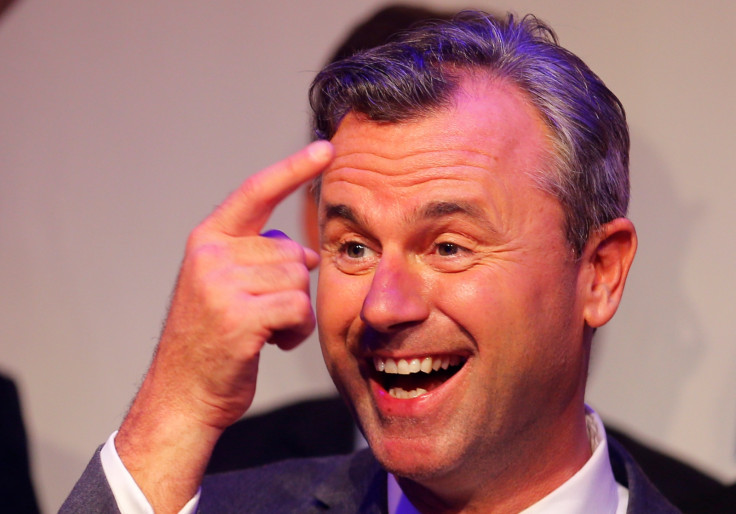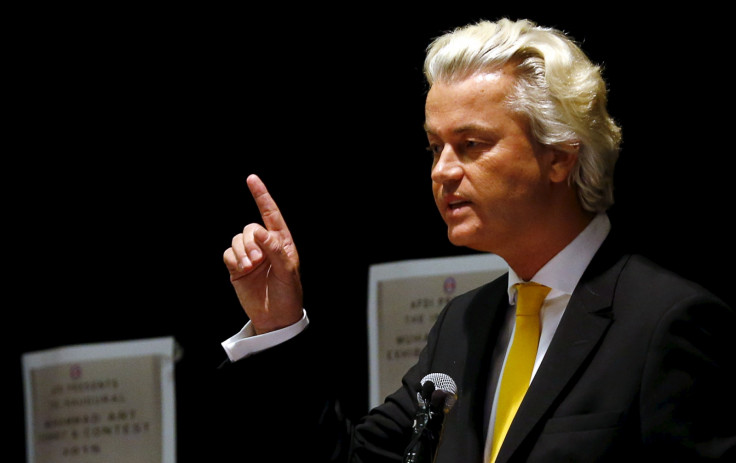Austria: How presidential candidate Norbert Hofer shook up the European political landscape

Norbert Hofer says the Glock 9mm pistol he carried around on the Austrian presidential campaign trail is a "natural consequence" of the rise in immigration. That may seem at odds with his campaign catchphrase "The Voice of Reason", but despite his narrow defeat on Monday 23 May, the Freedom Party's candidate will build on the discontent in the country over the issue.
This is because in 2015 alone, the migrant crisis added 90,000 people to Austria's population of 8.6 million, the equivalent of the UK taking in an extra 700,000 people.
Gustav Gressel, senior policy fellow from the European Council on Foreign Relations, told IBTimes UK that Hofer has capitalised on the crisis and Austria's lack of preparation for its impact.
"Austria's coordination with Germany never really worked out and that played into their hands perfectly as people are uncertain about the refugee crisis, which is something that polarises many right across Europe," he said.
In the first round of the presidential vote in April 2016, Hofer got 35.1% of the vote which was more than the Social Democratic Party and the Austrian People's Party combined.
It sparked the resignation of the country's chancellor, Werner Faymann and was another milestone in the meteoric rise to prominence for Hofer, 45, who was once adviser to former party leader Heinz-Christian Strache, successor to Jörg Haider who was killed in a car crash in 2008.
Hofer's softly-spoken manner is in stark contrast to Haider's tub-thumping approach and he has consolidated the role that the Freedom Party has always played in Austrian politics. The party got 27% of the vote in the 1999 election, and acted as kingmaker in the government in the 1980s. This former aeronautical engineer could be in the cockpit of a surge in far-right politics throughout Europe.
Gressel said: "There is no chance of him glorifying the Third Reich or being openly anti-Semitic. He has never said something that you would not hear from a conservative politician like a [Nicolas] Sarkozy or someone like that who is not regarded as extremist. Half of that is his tactics, he is clever enough not to say certain things in public."
European politics transformed

What he has said in public though is the campaign soundbite: "To those in Austria who go to war for the Islamic State or rape women, I say to those people: 'This is not your home'."
His opponent Alexander van der Bellen, who beat him to the post of president, has tried to strike a more conciliatory tone, saying: "I've experienced how Austria rose from the ruins of World War Two, caused by the madness of nationalism."
But many assessed Hofer by some of his backers which include the Dutch far-right politician Geert Wilders, whose own Party of Freedom is topping polls in the Netherlands. Wilders has said that a Freedom Party win could usher in an even stronger populist movement throughout Europe.
This chimes with the rise of a neo-fascist party entering parliament in Cyprus, the appeal in Germany of the anti-Islamic Alternative for Deutschland (AfD) and the expectation that Marine Le Pen will reach the second round of the French presidential election.
Lecturer in modern European history at Royal Holloway, University of London, Andrea Mammone has said that Hofer's success shows how mainstream politicians, journalists and academics are "legitimising" the far-right in Europe.
He said: "While the Austrian elections are still unclear Hofer rightly claims his Freedom Party has 'won'. This is a reflection of the millions of votes they've secured and because the social democrats have not ruled out a future coalition with the FPO."
Even though he was defeated by van der Ballen, his party will be keen to build on his success and work towards the national elections in 2018 in which they could have an even bigger breakthrough.
© Copyright IBTimes 2025. All rights reserved.






















